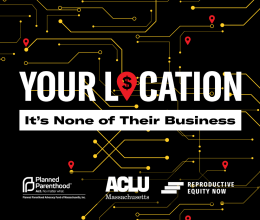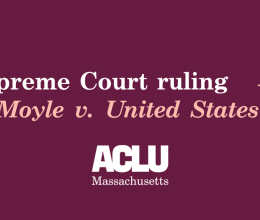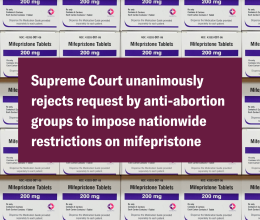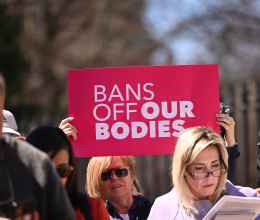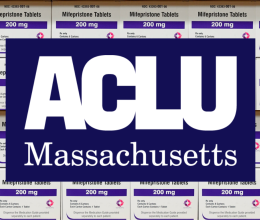
The Supreme Court announced today that it would hear another case with the potential for serious effects on people’s ability to access abortion.
Just 18 months after overturning Roe v. Wade, the Supreme Court agreed to review a decision in a case brought by anti-abortion activists that could make it more difficult for people nationwide to access mifepristone, a medication used in most abortions in this country today. Mifepristone has been safely and effectively used for more than 20 years — by more than five million people in the U.S. — for early abortion care and the gold standard treatment for miscarriage.
The case comes to the Supreme Court after the U.S. Department of Justice and Danco Laboratories, LLC asked the court to review a decision from the Fifth Circuit Court of Appeals. This decision could have serious effects on the availability of abortion by imposing restrictions on people’s ability to access mifepristone. If the Supreme Court allows the lower court ruling to stand, it could impose severe, medically unnecessary restrictions on mifepristone, blocking people from being able to receive mifepristone by mail like other similarly safe medications and instead forcing them to travel, sometimes hundreds of miles, just to pick up their medication. It could also prohibit many qualified health care professionals from prescribing mifepristone for abortion and miscarriage care, thus depriving some patients access to this critical medication altogether.
Today’s action by the Court makes no immediate changes to the availability of abortion care; any changes to access to the medication as a result of this lawsuit are on hold while the Supreme Court considers the case.
Abortion remains legal in Massachusetts because the state legislature worked with the ACLU and other advocates to codify the right to abortion into state law and to pass best-in-the-nation protections for abortion providers and patients. People seeking or providing abortion care in Massachusetts can contact the Abortion Legal Hotline, a free and confidential resource to connect Massachusetts-based health care patients, providers, and helpers obtaining care in the state with free legal advice and resources about abortion access and care.
Carol Rose, Executive Director of the ACLU of Massachusetts, issued the following statement in response to the decision by the Supreme Court:
“Anti-abortion extremists have again put our bodily autonomy back in the Supreme Court’s hands. This case could further decimate people’s ability to make personal medical decisions that are best for themselves, their families, and their circumstances. Let’s be clear: This is yet another step toward extremists’ goal to ban abortion nationwide.
“While we continue to fight for the fundamental right to make decisions about our bodies and our lives, we know that anti-abortion extremists are getting more sophisticated in their attacks on abortion access – even in states where the right to abortion is secure. They want to use every tool to track and harass people from hostile states that seek out care in places like Massachusetts. Here in the Commonwealth, we have an opportunity — and obligation — to continue to push reproductive freedom forward, including by protecting patients’ and providers’ sensitive location data.”
For more information about the Location Shield Act, go to: https://www.aclum.org/en/ban-sale-location-data
